Unit 1 Where did you go on vacation? Section A Grammar focus-3c课件(45张PPT)
文档属性
| 名称 | Unit 1 Where did you go on vacation? Section A Grammar focus-3c课件(45张PPT) | 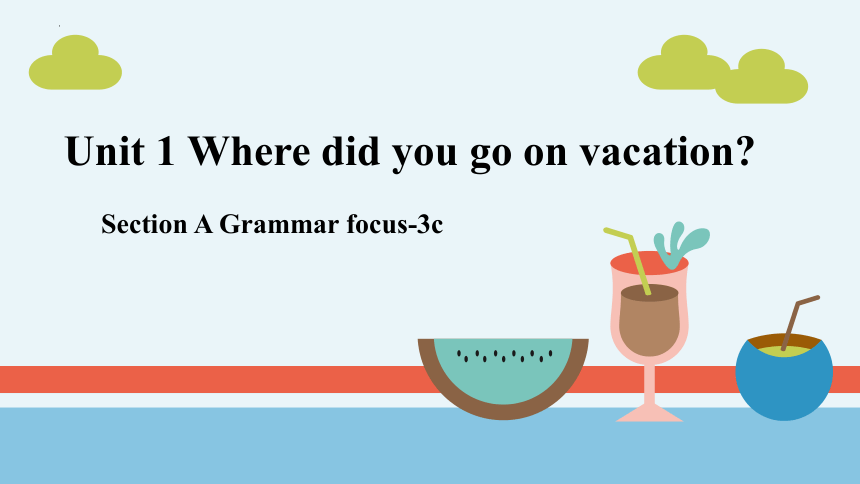 | |
| 格式 | pptx | ||
| 文件大小 | 10.1MB | ||
| 资源类型 | 试卷 | ||
| 版本资源 | 人教新目标(Go for it)版 | ||
| 科目 | 英语 | ||
| 更新时间 | 2022-09-07 08:41:06 | ||
图片预览





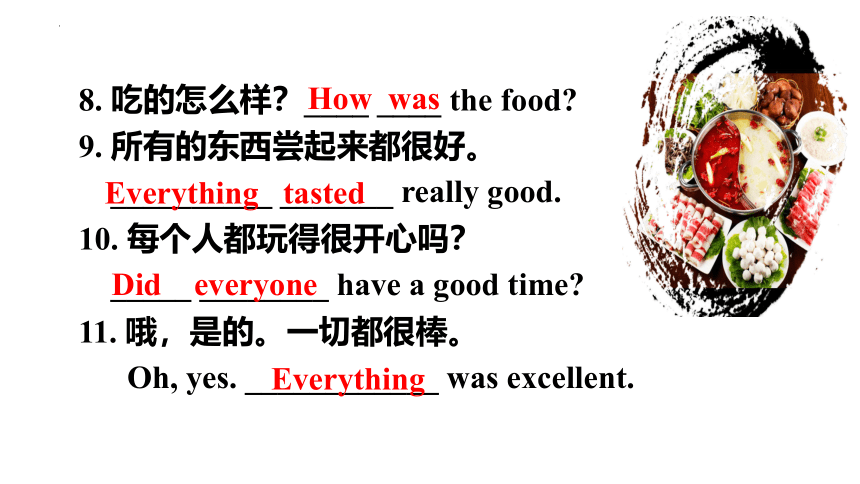

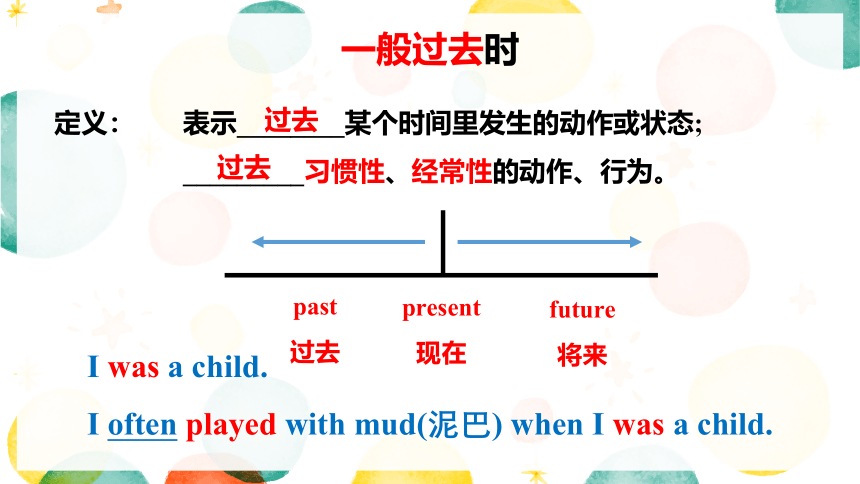
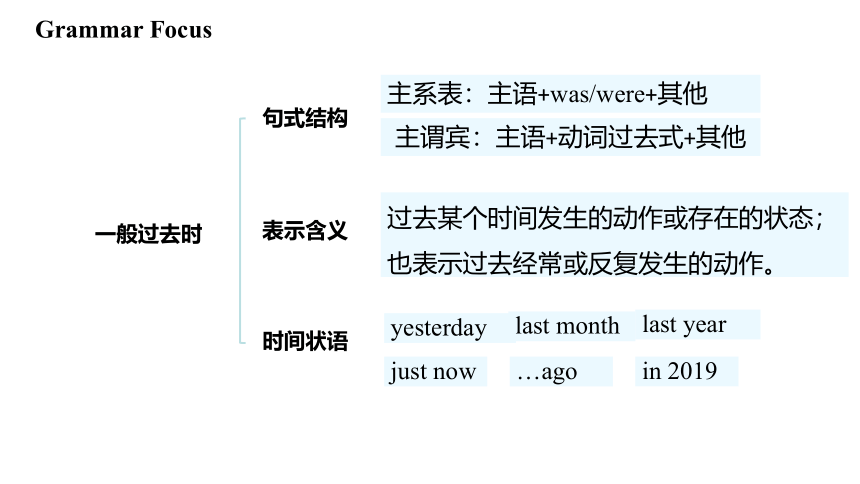

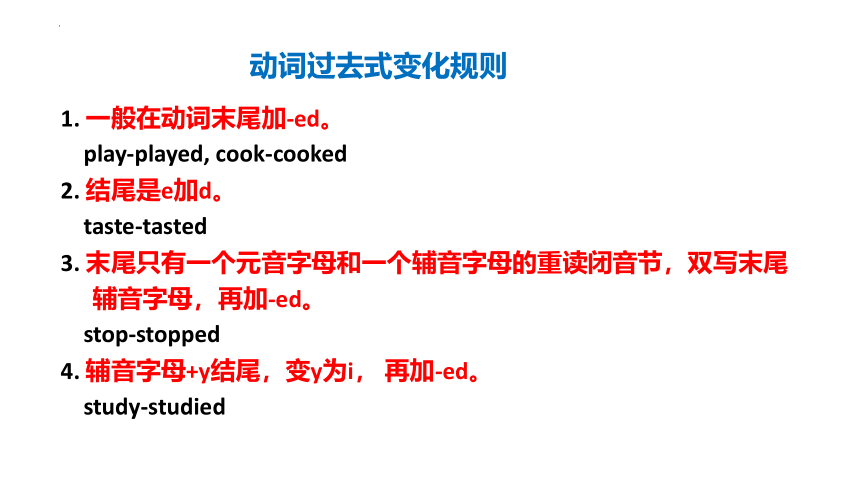
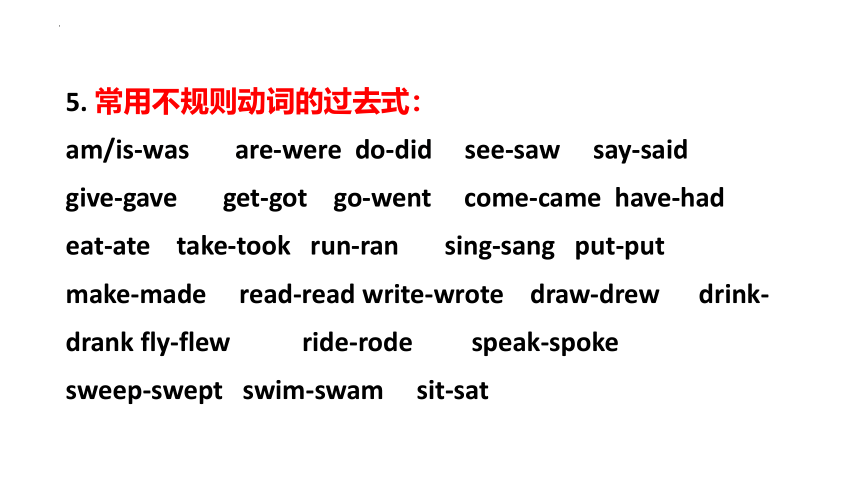
文档简介
(共45张PPT)
Unit 1 Where did you go on vacation
Section A Grammar focus-3c
Learning goals
1.Curriculum words: something, nothing, everyone, myself, yourself,
hen, pig, seem, bored, someone, diary
5. Sentences:① — Where did you go on vacation — I went to...
② —Did you… — Yes, I did./No, I didn't.
③ —How was… — It was...
2. Useful expressions: of course
3. Functions:Talk about past events
4. Grammar:①Indefinite pronouns 不定代词
②Question structure of the simple past tense
Yesterday Once More
When I was young I'd listen to the radio
Waiting for my favorite songs
When they played I'd sing along
It made me smile
Those were such happy times and not so long ago
How I wondered where they'd gone
But they're back again just like a long lost friend
All the songs I love so well
Every shalala every wo wo oh
Still shines
Every shing-a-ling-a-ling that they're starting to sing
So fine
一般过去时
________________ 去度假
________________ 给某人买某物
go to summer camp __________
go to the beach _________
__________________ 去爬山
__________________ 好久不见
__________________ 大多数时间
__________________ 备考
__________________ 相当多
__________________ 特别的东西
go on vacation
buy sth. for sb.
去夏令营
去海滩
go to the mountains
long time no see
most of the time
study for tests
quite a few
something special
1. 你去了什么地方度假?______ _____ you go on ________
2. 我去了纽约市。I _____ ____ New York City.
3. 你和别的什么人一起去的吗?____ ___ go out with _____
4. 不,没有别人在这儿。每个人都在度假。
No. ___ _____ was here. __________ was on ________.
5. 你买了什么特别的东西了吗? __ you buy _____ _______
6. 是的,我为我爸爸买了些东西。
Yes, I _______ _________ for my father.
7. 不,我没有买什么东西。No, I _______ _________.
vacation
Where did
went to
完成句子
Did you
anyone
No one
Everyone
vacation
anything special
Did
bought something
bought nothing
8. 吃的怎么样?____ ____ the food
9. 所有的东西尝起来都很好。
__________ _______ really good.
10. 每个人都玩得很开心吗?
_____ ________ have a good time
11. 哦,是的。一切都很棒。
Oh, yes. ____________ was excellent.
How was
Everything tasted
Did everyone
Everything
Discussion
Where did you go on vacation I went to New York City
Did you go out with anyone No. No one was here. Everyone was on vacation.
Did you buy anything special Yes, I bought something for my father.
No, I bought nothing.
How was the food Everything tasted really good!
Did everyone have a good time Oh, yes. Everything was excellent.
What’s the type of these sentences Can you find their common features
一般过去时疑问句在用助动词did提问,之后的动词要用原形
Grammar Focus
一般过去时
present
现在
past
过去
future
将来
定义: 表示________某个时间里发生的动作或状态;
_________习惯性、经常性的动作、行为。
一般过去时
过去
过去
I was a child.
I often played with mud(泥巴) when I was a child.
Grammar Focus
句式结构
表示含义
时间状语
主系表:主语+was/were+其他
主谓宾:主语+动词过去式+其他
过去某个时间发生的动作或存在的状态;也表示过去经常或反复发生的动作。
yesterday
last month
last year
just now
…ago
in 2019
一般过去时
一般过去时
be动词 行为动词
肯定陈述
否定 陈述
一般疑问句及 回答
主语 + was/were + 其他.
主语 + 动词的过去式 + 其他.
主语 + was/were not + 其他.
主语 + didn’t + 动词原形 + 其他.
Was/Were + 主语 + 其他
(肯) Yes, 主语 +was/were.
(否) No, 主语 +wasn’t/
weren’t.
Did + 主语 + 动词原形 + 其他
(肯)Yes, 主语+did.
(否) No, 主语 + didn’t.
1. 一般在动词末尾加-ed。
play-played, cook-cooked
2. 结尾是e加d。
taste-tasted
3. 末尾只有一个元音字母和一个辅音字母的重读闭音节,双写末尾辅音字母,再加-ed。
stop-stopped
4. 辅音字母+y结尾,变y为i, 再加-ed。
study-studied
动词过去式变化规则
5. 常用不规则动词的过去式:
am/is-was are-were do-did see-saw say-said give-gave get-got go-went come-came have-had
eat-ate take-took run-ran sing-sang put-put make-made read-read write-wrote draw-drew drink-drank fly-flew ride-rode speak-spoke
sweep-swept swim-swam sit-sat
时间状语
动词变化
v.+ed
v.+d
y变i加-ed
双写辅音字母加-ed
规则
变化
不规则变化
is/am-was are-were
do-did cut-cut
swim-swam ride-rode
draw-drew build-built feel-felt bring-brought
play-played
offer-offered
like-liked
hate-hated
cry-cried
study-studied
plan-planned
stop-stopped
yesterday, last ..., ...ago, just now, in...
基本句式
肯定句
否定句
一般疑问句及回答
主语+was/were+其他.
主语+动词过去式+其他.
主语+was/were+not+其他.
主语+didn’t+动词原形+其他.
Was/were+主语+其他
Yes, 主语+was/were.
No, 主语+wasn't/weren't.
Did+主语+动词原形+其他
Yes, 主语+did.
No, 主语+didin't.
一般过去时
Summary
肯定句:He _____ at home yesterday.
We _____ happy at the party.
否定句:He _______ at home yesterday.
We _______ happy at the party.
疑问句:--_____ he at home yesterday
--Yes, he ____./No, he _______.
系动词be的一般过去时
am (is) →was are →were
be动词
表过去存在的状态。
was
were
wasn't
weren't
Was
was
wasn't
肯定句:主语+动词过去式+其它
I went to the movie yesterday.
否定句:主语+didn’t+动词原形+其它
I ______ _____ the movie yesterday.
一般疑问句:Did +主语+动词原形+其它
--_____ you _____ to the movie yesterday
--Yes, I ____./No, I _______.
实义动词的一般过去时
行为动词
表过去发生的动作。
didn't go
Did go
did
didn't
【语境应用】完成句子 。
1) 刚才Sandy尝了尝汤。
Sandy _______ _______ _______ just now.
2) 我昨晚在聚会上待到很晚。
I _______ _______ at the party last night.
3) 他们昨天下午四点到达北京的。
They _______ _______ Beijing at 4:00 yesterday afternoon.
tasted the soup
stayed late
arrived in /
got to
4) Cathy在母亲节给她妈妈买了一件礼物。
Cathy _______ _______ _______ for her mother on Mother's Day.
5) 今天早上我起晚了,因此什么都没有吃。
I got up late this morning, so I _______ _______.
6) Bob在公共汽车上感觉很糟,因为太挤了。
Bob _______ _______ on the bus because it was too crowded.
bought a gift
ate
nothing
felt terrible
Grammar Focus
Circle
Where did you go on vacation I went to New York City
Did you go out with anyone No. No one was here. Everyone was on vacation.
Did you buy anything special Yes, I bought something for my father.
No, I bought nothing.
How was the food Everything tasted really good!
Did everyone have a good time Oh, yes. Everything was excellent.
复合不定代词
every- 每个 some- 某个 any- 任何 no-
没有
-thing 事物
-one 人
-body 人
where 地方
复合不定代词: 由some, any, no, every加上-one, -body, -thing构成复合代词。我们称之为复合不定代词。
everything
something
anything
nothing
everyone
someone
anyone
no one
everybody
somebody
anybody
nobody
everywhere
somewhere
anywhere
nowhere
There is someone outside the door.
I don't have anything to say today.
Is there anyone in the room?
( )1.—Bob, supper is ready.
—I don’t want to eat , Grandma. I’m still full.
A.everything B.anything C.something D.nothing
2.我想吃点东西。 I’d like ___________ to eat.
3.今天有人给我打电话吗?Did ________ call me today
【练一练】
something
anyone
B
1. some一般用于肯定句
any一般用于疑问句和否定句
Will you ask someone to carry the box for me
Would you like something to eat
但在表示请求、建议、反问等的疑问句中,问话者希望得到肯定答复时,通常用some
( )—Would you like to eat? —No,thanks.
A.something B.anything C.nothing D.everything
Anyone can do this.
I can do anything for you.
any也可用在肯定句中,表示“任何”
A
【练一练】
2.不定代词+形容词
( )1.My brother likes eating
A.delicious something B.delicious someone
C.something delicious D.someone delicious
C
I want to try something delicious.
She always buys something useful for me.
【练一练】
Someone is waiting for you at door.
Everything begins to grow in sping.
3. 不定代词作主语时,谓语动词用三单。
1.— everyone here now —Yes.
A.Are B.Is C.Was D.Were
2.Nobody (be) in our school yesterday morning.
【练一练】
B
is
1.—Would you like ___to eat —No,thanks.
A.something B.anything C.nothing D.everything
2.—Bob, supper is ready.
—I don’t want to eat , Grandma. I’m still full.
A.everything B.anything C.something D.nothing
3.—Where is my new dictionary
—I don’t know. It’s not here. Maybe ____took it.
A.everyone B.no one C.someone D.anyone
4.May I have a talk with you I have __ to tell you.
A.nothing important B.important nothing
C.something important D.important something
【练一练】
anything
something
everything
nothing
anyone
someone
no one
everyone
指物
指人
但在表示请求、建议或征求意见的疑问句中常用some或something,如:Would you like something to eat
something, someone与some一样常用于肯定句,
而anything, anyone与any一样常用于否定句和疑问句。
anybody
somebody
nobody
everybody
Let’s do something interesting.
1. 当形容词修饰不定代词时,应放其后。
e.g. 这本书里有什么新东西吗?
Is there _________ _____ in this book
今天没有什么特别的事。
There’s _________ _______ today.
anything new
nothing special
Everyone in this village is friendly.
Nobody knows what the future will be like.
2. 复合不定代词作主语时,谓语动词用单数形式。
e.g. Something ____ (is/are) wrong with my watch.
我的手表出了点毛病。
Well, everyone ______ (want) to win.
是的,每个人都想赢。
is
wants
3. 一般疑问句中,当问话人希望得到对方肯定回答时,要用some-类的复合不定代词;
当问话人只是提出问题,对回答没有倾向性时,用any-类的复合不定代词。
a. Do you have something to tell me
你有事要告诉我吧?
b. Do you have anything to tell me
有什么事要告诉我吗?
a表示说话人期望有事告诉他,b无此含义。
a. Did somebody phone last night
昨晚有人来电话了吧?
b. Did anybody phone last night
昨晚有人来过电话吗?
a意味着说话人期望或预料有人来过电话,b无此含义。
no-类的复合不定代词表示否定的意义。
e.g. We looked but saw nothing.
3a
anyone
something
anything
everything
nothing
Linda: Did you do _________ fun on your vacation, Alice
Alice: Yes, I did. I went to Sanya.
Linda: How did you like it
Alice: Well, it was my first time there, so______ was really interesting.
Linda: Did you do with ________
Alice: Yes, I did. I went with my sister.
Linda: Did you go shopping
Alice: Of course! I bought _____ for my parents, but ____ for myself.
Linda: Why didn’t you buy _________ for yourself
Alice: I didn’t really see__________ I liked.
anything
everything
anyone
something
nothing
anything
anything
Fill in the blanks with the words in the box and practice the conversation.
当然;自然。
Of course not. 当然不。
反身代词,我自己
反身代词,你自己
1.How did you like it?
=What do you think of it
你觉得它怎么样?
3b
anything everything nothing everyone no one
anything
everyone/anyone
Everything
nothing
no one
Fill in the blanks in the email message with the words in the box.
1. the only problem is that +句子 唯一的问题就是….
2. nothing much to do but read 除了看书没什么其他可做的事情
3. seem to be bored 看起来似乎...
4. Bye for now! 就此拜拜啦
1.seem“好像,似乎……”
I seem to have a cold.我似乎感冒了。
It seems that no one believes you.看起来好像没有人相信你
It seems like a good idea.它好像是个好主意。
a. seem+to do sth.
b. It seems that+从句
c. It seems like…
2.bored与boring “无聊的;令人厌烦的”
1. I’m ________ with what he said.
我对他说的话厌烦极了。
2. I find the story very ________.
我发现这个故事太无聊了
bored
boring
【练一练】
含有- ed形容词一般在句中修饰人
含有-ing形容词一般在句中修饰事或物
还有interest, excite, relax, surprise...
3a
anyone
something
anything
everything
nothing
Linda: Did you do _________ fun on your vacation, Alice
Alice: Yes, I did. I went to Sanya.
Linda: How did you like it
Alice: Well, it was my first time there, so_________ was really interesting.
Linda: Did you do with ________
Alice: Yes, I did. I went with my sister.
Alice: Of course! I bought __________ for my parents, but _________ for myself.
Linda: Why didn’t you buy _________ for yourself
Alice: I didn’t really see__________ I liked.
anything
everything
anyone
something
nothing
anything
anything
Linda: Did you go shopping
Fill in the blanks with the words in the box and practice the conversation.
3b
anything everything nothing everyone no one
Dear Bill,
How was your vacation Did you do _________ interesting Did _________________ in the family go with you I went to a friend’s farm in the countryside with my family. ___________was great. We fed some hens and saw some baby pigs. They were so cute! The only problem was that there was _________ much to do in the evening but read. Still ___________seemed to be bored. Bye for now!
Mark
anything
everyone/anyone
Everything
nothing
no one
Fill in the blanks in the email message with the words in the box.
Ask your group questions about their last vacation. Then tell the class your results
3c
In our group, everyone ate something at a restaurant…
Did you do anything else during last vacation
Try to write down as many things you do as possible.
buy something
play computer games
visit someone
read something interesting
play basketball
eat something at a restaurant
swim
watch TV
go to movies
keep a diary
写日记
have a picnic
go to the mountains
do homework
Make a survey
Ask your group questions about their last vacation. Then tell the class your results.
3c
Did you… Everyone Someone (write the classmate’s name) No one
eat anything at a restaurant
read anything interesting
visit anyone in your family
buy anything
keep a diary写日记
Eg: In our group everyone ate something at a restaurant.
Only Mary bought something. No one kept a diary…
1. key words and phrases:
something, nothing, everyone, myself, yourself, hen, pig, seem, bored, someone, diary….
2.不定代词的用法 anyone, someone, everyone, no one, anything, something, everything and nothing
Summary
Exercises
一 单项选择
1
David is a tennis player. He to play tennis when he was six years old.
A. begins B. will begin C. began D. has begun
2
— Alice has gone out.
— Oh, has she What time _____ she _____
A.has; gone B.will; go C.did; go D.is; going
C
C
Exercises
一 单项选择
3
—Is there else in the classroom
—It’s empty. is listening to a speech in the school hall.
A. anyone; Anyone B. anyone; Everyone
C. everyone; Anyone D. everyone; Everyone
4
—Why are you laughing, Daniel
— There is _____ funny in the e and see.
A.anything B.something C.everything D.nothing
B
B
Exercises
二 改错
1
I didn’t see someone in the theater. ( ) ______________
2
Did you find funny anything in the book ( ) ______________
A B C
3
There are something wrong with my bike. ( ) _____________
A B C
A B C
B
AB
A
anyone
anything funny
is
Exercises
三 完成句子
1
今天的报纸上没有什么有趣的东西。
There is ___ in today’s newspaper.
2
如果你想保持牙齿健康,你最好不要吃任何甜食。
If you want to keep your teeth healthy, you'd better not eat __________ __________ a lot.
我有一些重要的事情要告诉汤姆。
I have _____ to tell Tom.
3
something important
nothing interesting
anything
sweet
Summary
时间状语
动词变化
v.+ed
v.+d
y变i加-ed
双写辅音字母加-ed
规则
变化
不规则变化
is/am-was are-were
do-did cut-cut
swim-swam ride-rode
draw-drew bring-brought
build-built feel-felt
play-played
offer-offered
like-liked
hate-hated
cry-cried
study-studied
plan-planned
stop-stopped
yesterday, last month,last year, just now,...ago
基本句式
肯定句
否定句
一般疑问句及回答
主语+was/were+其他.
主语+动词过去式+其他.
主语+was/were+not+其他.
主语+didn‘t+动词原形+其他.
Was/were+主语+其他
Yes, 主语+was/were.
No, 主语+wasn't/weren't.
Did+主语+动词原形+其他
Yes, 主语+did.
No, 主语+didin't.
一般过去时
Summary
复合不定代词
指人(以-one/-body结尾)
指物(以-thing结尾)
everybody (每个人)
someone (某人)
everyone (每个人)
anyone (任何人)
everything (一切事物)
anything (任何事物)
something (某事物)
nothing (没有什么)
somebody (某人)
anybody (任何人)
no one (没有人)
nobody (没有人)
复合代词要牢记,修饰成分后边放,如若它来作主语,谓语单数没商量。
some-代词肯定句,any-代词否、疑忙,若是希望得肯定,some-代词不相让。
Unit 1 Where did you go on vacation
Section A Grammar focus-3c
Learning goals
1.Curriculum words: something, nothing, everyone, myself, yourself,
hen, pig, seem, bored, someone, diary
5. Sentences:① — Where did you go on vacation — I went to...
② —Did you… — Yes, I did./No, I didn't.
③ —How was… — It was...
2. Useful expressions: of course
3. Functions:Talk about past events
4. Grammar:①Indefinite pronouns 不定代词
②Question structure of the simple past tense
Yesterday Once More
When I was young I'd listen to the radio
Waiting for my favorite songs
When they played I'd sing along
It made me smile
Those were such happy times and not so long ago
How I wondered where they'd gone
But they're back again just like a long lost friend
All the songs I love so well
Every shalala every wo wo oh
Still shines
Every shing-a-ling-a-ling that they're starting to sing
So fine
一般过去时
________________ 去度假
________________ 给某人买某物
go to summer camp __________
go to the beach _________
__________________ 去爬山
__________________ 好久不见
__________________ 大多数时间
__________________ 备考
__________________ 相当多
__________________ 特别的东西
go on vacation
buy sth. for sb.
去夏令营
去海滩
go to the mountains
long time no see
most of the time
study for tests
quite a few
something special
1. 你去了什么地方度假?______ _____ you go on ________
2. 我去了纽约市。I _____ ____ New York City.
3. 你和别的什么人一起去的吗?____ ___ go out with _____
4. 不,没有别人在这儿。每个人都在度假。
No. ___ _____ was here. __________ was on ________.
5. 你买了什么特别的东西了吗? __ you buy _____ _______
6. 是的,我为我爸爸买了些东西。
Yes, I _______ _________ for my father.
7. 不,我没有买什么东西。No, I _______ _________.
vacation
Where did
went to
完成句子
Did you
anyone
No one
Everyone
vacation
anything special
Did
bought something
bought nothing
8. 吃的怎么样?____ ____ the food
9. 所有的东西尝起来都很好。
__________ _______ really good.
10. 每个人都玩得很开心吗?
_____ ________ have a good time
11. 哦,是的。一切都很棒。
Oh, yes. ____________ was excellent.
How was
Everything tasted
Did everyone
Everything
Discussion
Where did you go on vacation I went to New York City
Did you go out with anyone No. No one was here. Everyone was on vacation.
Did you buy anything special Yes, I bought something for my father.
No, I bought nothing.
How was the food Everything tasted really good!
Did everyone have a good time Oh, yes. Everything was excellent.
What’s the type of these sentences Can you find their common features
一般过去时疑问句在用助动词did提问,之后的动词要用原形
Grammar Focus
一般过去时
present
现在
past
过去
future
将来
定义: 表示________某个时间里发生的动作或状态;
_________习惯性、经常性的动作、行为。
一般过去时
过去
过去
I was a child.
I often played with mud(泥巴) when I was a child.
Grammar Focus
句式结构
表示含义
时间状语
主系表:主语+was/were+其他
主谓宾:主语+动词过去式+其他
过去某个时间发生的动作或存在的状态;也表示过去经常或反复发生的动作。
yesterday
last month
last year
just now
…ago
in 2019
一般过去时
一般过去时
be动词 行为动词
肯定陈述
否定 陈述
一般疑问句及 回答
主语 + was/were + 其他.
主语 + 动词的过去式 + 其他.
主语 + was/were not + 其他.
主语 + didn’t + 动词原形 + 其他.
Was/Were + 主语 + 其他
(肯) Yes, 主语 +was/were.
(否) No, 主语 +wasn’t/
weren’t.
Did + 主语 + 动词原形 + 其他
(肯)Yes, 主语+did.
(否) No, 主语 + didn’t.
1. 一般在动词末尾加-ed。
play-played, cook-cooked
2. 结尾是e加d。
taste-tasted
3. 末尾只有一个元音字母和一个辅音字母的重读闭音节,双写末尾辅音字母,再加-ed。
stop-stopped
4. 辅音字母+y结尾,变y为i, 再加-ed。
study-studied
动词过去式变化规则
5. 常用不规则动词的过去式:
am/is-was are-were do-did see-saw say-said give-gave get-got go-went come-came have-had
eat-ate take-took run-ran sing-sang put-put make-made read-read write-wrote draw-drew drink-drank fly-flew ride-rode speak-spoke
sweep-swept swim-swam sit-sat
时间状语
动词变化
v.+ed
v.+d
y变i加-ed
双写辅音字母加-ed
规则
变化
不规则变化
is/am-was are-were
do-did cut-cut
swim-swam ride-rode
draw-drew build-built feel-felt bring-brought
play-played
offer-offered
like-liked
hate-hated
cry-cried
study-studied
plan-planned
stop-stopped
yesterday, last ..., ...ago, just now, in...
基本句式
肯定句
否定句
一般疑问句及回答
主语+was/were+其他.
主语+动词过去式+其他.
主语+was/were+not+其他.
主语+didn’t+动词原形+其他.
Was/were+主语+其他
Yes, 主语+was/were.
No, 主语+wasn't/weren't.
Did+主语+动词原形+其他
Yes, 主语+did.
No, 主语+didin't.
一般过去时
Summary
肯定句:He _____ at home yesterday.
We _____ happy at the party.
否定句:He _______ at home yesterday.
We _______ happy at the party.
疑问句:--_____ he at home yesterday
--Yes, he ____./No, he _______.
系动词be的一般过去时
am (is) →was are →were
be动词
表过去存在的状态。
was
were
wasn't
weren't
Was
was
wasn't
肯定句:主语+动词过去式+其它
I went to the movie yesterday.
否定句:主语+didn’t+动词原形+其它
I ______ _____ the movie yesterday.
一般疑问句:Did +主语+动词原形+其它
--_____ you _____ to the movie yesterday
--Yes, I ____./No, I _______.
实义动词的一般过去时
行为动词
表过去发生的动作。
didn't go
Did go
did
didn't
【语境应用】完成句子 。
1) 刚才Sandy尝了尝汤。
Sandy _______ _______ _______ just now.
2) 我昨晚在聚会上待到很晚。
I _______ _______ at the party last night.
3) 他们昨天下午四点到达北京的。
They _______ _______ Beijing at 4:00 yesterday afternoon.
tasted the soup
stayed late
arrived in /
got to
4) Cathy在母亲节给她妈妈买了一件礼物。
Cathy _______ _______ _______ for her mother on Mother's Day.
5) 今天早上我起晚了,因此什么都没有吃。
I got up late this morning, so I _______ _______.
6) Bob在公共汽车上感觉很糟,因为太挤了。
Bob _______ _______ on the bus because it was too crowded.
bought a gift
ate
nothing
felt terrible
Grammar Focus
Circle
Where did you go on vacation I went to New York City
Did you go out with anyone No. No one was here. Everyone was on vacation.
Did you buy anything special Yes, I bought something for my father.
No, I bought nothing.
How was the food Everything tasted really good!
Did everyone have a good time Oh, yes. Everything was excellent.
复合不定代词
every- 每个 some- 某个 any- 任何 no-
没有
-thing 事物
-one 人
-body 人
where 地方
复合不定代词: 由some, any, no, every加上-one, -body, -thing构成复合代词。我们称之为复合不定代词。
everything
something
anything
nothing
everyone
someone
anyone
no one
everybody
somebody
anybody
nobody
everywhere
somewhere
anywhere
nowhere
There is someone outside the door.
I don't have anything to say today.
Is there anyone in the room?
( )1.—Bob, supper is ready.
—I don’t want to eat , Grandma. I’m still full.
A.everything B.anything C.something D.nothing
2.我想吃点东西。 I’d like ___________ to eat.
3.今天有人给我打电话吗?Did ________ call me today
【练一练】
something
anyone
B
1. some一般用于肯定句
any一般用于疑问句和否定句
Will you ask someone to carry the box for me
Would you like something to eat
但在表示请求、建议、反问等的疑问句中,问话者希望得到肯定答复时,通常用some
( )—Would you like to eat? —No,thanks.
A.something B.anything C.nothing D.everything
Anyone can do this.
I can do anything for you.
any也可用在肯定句中,表示“任何”
A
【练一练】
2.不定代词+形容词
( )1.My brother likes eating
A.delicious something B.delicious someone
C.something delicious D.someone delicious
C
I want to try something delicious.
She always buys something useful for me.
【练一练】
Someone is waiting for you at door.
Everything begins to grow in sping.
3. 不定代词作主语时,谓语动词用三单。
1.— everyone here now —Yes.
A.Are B.Is C.Was D.Were
2.Nobody (be) in our school yesterday morning.
【练一练】
B
is
1.—Would you like ___to eat —No,thanks.
A.something B.anything C.nothing D.everything
2.—Bob, supper is ready.
—I don’t want to eat , Grandma. I’m still full.
A.everything B.anything C.something D.nothing
3.—Where is my new dictionary
—I don’t know. It’s not here. Maybe ____took it.
A.everyone B.no one C.someone D.anyone
4.May I have a talk with you I have __ to tell you.
A.nothing important B.important nothing
C.something important D.important something
【练一练】
anything
something
everything
nothing
anyone
someone
no one
everyone
指物
指人
但在表示请求、建议或征求意见的疑问句中常用some或something,如:Would you like something to eat
something, someone与some一样常用于肯定句,
而anything, anyone与any一样常用于否定句和疑问句。
anybody
somebody
nobody
everybody
Let’s do something interesting.
1. 当形容词修饰不定代词时,应放其后。
e.g. 这本书里有什么新东西吗?
Is there _________ _____ in this book
今天没有什么特别的事。
There’s _________ _______ today.
anything new
nothing special
Everyone in this village is friendly.
Nobody knows what the future will be like.
2. 复合不定代词作主语时,谓语动词用单数形式。
e.g. Something ____ (is/are) wrong with my watch.
我的手表出了点毛病。
Well, everyone ______ (want) to win.
是的,每个人都想赢。
is
wants
3. 一般疑问句中,当问话人希望得到对方肯定回答时,要用some-类的复合不定代词;
当问话人只是提出问题,对回答没有倾向性时,用any-类的复合不定代词。
a. Do you have something to tell me
你有事要告诉我吧?
b. Do you have anything to tell me
有什么事要告诉我吗?
a表示说话人期望有事告诉他,b无此含义。
a. Did somebody phone last night
昨晚有人来电话了吧?
b. Did anybody phone last night
昨晚有人来过电话吗?
a意味着说话人期望或预料有人来过电话,b无此含义。
no-类的复合不定代词表示否定的意义。
e.g. We looked but saw nothing.
3a
anyone
something
anything
everything
nothing
Linda: Did you do _________ fun on your vacation, Alice
Alice: Yes, I did. I went to Sanya.
Linda: How did you like it
Alice: Well, it was my first time there, so______ was really interesting.
Linda: Did you do with ________
Alice: Yes, I did. I went with my sister.
Linda: Did you go shopping
Alice: Of course! I bought _____ for my parents, but ____ for myself.
Linda: Why didn’t you buy _________ for yourself
Alice: I didn’t really see__________ I liked.
anything
everything
anyone
something
nothing
anything
anything
Fill in the blanks with the words in the box and practice the conversation.
当然;自然。
Of course not. 当然不。
反身代词,我自己
反身代词,你自己
1.How did you like it?
=What do you think of it
你觉得它怎么样?
3b
anything everything nothing everyone no one
anything
everyone/anyone
Everything
nothing
no one
Fill in the blanks in the email message with the words in the box.
1. the only problem is that +句子 唯一的问题就是….
2. nothing much to do but read 除了看书没什么其他可做的事情
3. seem to be bored 看起来似乎...
4. Bye for now! 就此拜拜啦
1.seem“好像,似乎……”
I seem to have a cold.我似乎感冒了。
It seems that no one believes you.看起来好像没有人相信你
It seems like a good idea.它好像是个好主意。
a. seem+to do sth.
b. It seems that+从句
c. It seems like…
2.bored与boring “无聊的;令人厌烦的”
1. I’m ________ with what he said.
我对他说的话厌烦极了。
2. I find the story very ________.
我发现这个故事太无聊了
bored
boring
【练一练】
含有- ed形容词一般在句中修饰人
含有-ing形容词一般在句中修饰事或物
还有interest, excite, relax, surprise...
3a
anyone
something
anything
everything
nothing
Linda: Did you do _________ fun on your vacation, Alice
Alice: Yes, I did. I went to Sanya.
Linda: How did you like it
Alice: Well, it was my first time there, so_________ was really interesting.
Linda: Did you do with ________
Alice: Yes, I did. I went with my sister.
Alice: Of course! I bought __________ for my parents, but _________ for myself.
Linda: Why didn’t you buy _________ for yourself
Alice: I didn’t really see__________ I liked.
anything
everything
anyone
something
nothing
anything
anything
Linda: Did you go shopping
Fill in the blanks with the words in the box and practice the conversation.
3b
anything everything nothing everyone no one
Dear Bill,
How was your vacation Did you do _________ interesting Did _________________ in the family go with you I went to a friend’s farm in the countryside with my family. ___________was great. We fed some hens and saw some baby pigs. They were so cute! The only problem was that there was _________ much to do in the evening but read. Still ___________seemed to be bored. Bye for now!
Mark
anything
everyone/anyone
Everything
nothing
no one
Fill in the blanks in the email message with the words in the box.
Ask your group questions about their last vacation. Then tell the class your results
3c
In our group, everyone ate something at a restaurant…
Did you do anything else during last vacation
Try to write down as many things you do as possible.
buy something
play computer games
visit someone
read something interesting
play basketball
eat something at a restaurant
swim
watch TV
go to movies
keep a diary
写日记
have a picnic
go to the mountains
do homework
Make a survey
Ask your group questions about their last vacation. Then tell the class your results.
3c
Did you… Everyone Someone (write the classmate’s name) No one
eat anything at a restaurant
read anything interesting
visit anyone in your family
buy anything
keep a diary写日记
Eg: In our group everyone ate something at a restaurant.
Only Mary bought something. No one kept a diary…
1. key words and phrases:
something, nothing, everyone, myself, yourself, hen, pig, seem, bored, someone, diary….
2.不定代词的用法 anyone, someone, everyone, no one, anything, something, everything and nothing
Summary
Exercises
一 单项选择
1
David is a tennis player. He to play tennis when he was six years old.
A. begins B. will begin C. began D. has begun
2
— Alice has gone out.
— Oh, has she What time _____ she _____
A.has; gone B.will; go C.did; go D.is; going
C
C
Exercises
一 单项选择
3
—Is there else in the classroom
—It’s empty. is listening to a speech in the school hall.
A. anyone; Anyone B. anyone; Everyone
C. everyone; Anyone D. everyone; Everyone
4
—Why are you laughing, Daniel
— There is _____ funny in the e and see.
A.anything B.something C.everything D.nothing
B
B
Exercises
二 改错
1
I didn’t see someone in the theater. ( ) ______________
2
Did you find funny anything in the book ( ) ______________
A B C
3
There are something wrong with my bike. ( ) _____________
A B C
A B C
B
AB
A
anyone
anything funny
is
Exercises
三 完成句子
1
今天的报纸上没有什么有趣的东西。
There is ___ in today’s newspaper.
2
如果你想保持牙齿健康,你最好不要吃任何甜食。
If you want to keep your teeth healthy, you'd better not eat __________ __________ a lot.
我有一些重要的事情要告诉汤姆。
I have _____ to tell Tom.
3
something important
nothing interesting
anything
sweet
Summary
时间状语
动词变化
v.+ed
v.+d
y变i加-ed
双写辅音字母加-ed
规则
变化
不规则变化
is/am-was are-were
do-did cut-cut
swim-swam ride-rode
draw-drew bring-brought
build-built feel-felt
play-played
offer-offered
like-liked
hate-hated
cry-cried
study-studied
plan-planned
stop-stopped
yesterday, last month,last year, just now,...ago
基本句式
肯定句
否定句
一般疑问句及回答
主语+was/were+其他.
主语+动词过去式+其他.
主语+was/were+not+其他.
主语+didn‘t+动词原形+其他.
Was/were+主语+其他
Yes, 主语+was/were.
No, 主语+wasn't/weren't.
Did+主语+动词原形+其他
Yes, 主语+did.
No, 主语+didin't.
一般过去时
Summary
复合不定代词
指人(以-one/-body结尾)
指物(以-thing结尾)
everybody (每个人)
someone (某人)
everyone (每个人)
anyone (任何人)
everything (一切事物)
anything (任何事物)
something (某事物)
nothing (没有什么)
somebody (某人)
anybody (任何人)
no one (没有人)
nobody (没有人)
复合代词要牢记,修饰成分后边放,如若它来作主语,谓语单数没商量。
some-代词肯定句,any-代词否、疑忙,若是希望得肯定,some-代词不相让。
同课章节目录
- Unit 1 Where did you go on vacation?
- Section A
- Section B
- Unit 2 How often do you exercise?
- Section A
- Section B
- Unit 3 I'm more outgoing than my sister.
- Section A
- Section B
- Unit 4 What's the best movie theater?
- Section A
- Section B
- Unit 5 Do you want to watch a game show?
- Section A
- Section B
- Unit 6 I'm going to study computer science.
- Section A
- Section B
- Unit 7 Will people have robots?
- Section A
- Section B
- Unit 8 How do you make a banana milk shake?
- Section A
- Section B
- Unit 9 Can you come to my party?
- Section A
- Section B
- Unit 10 If you go to the party, you'll have a grea
- Section A
- Section B
